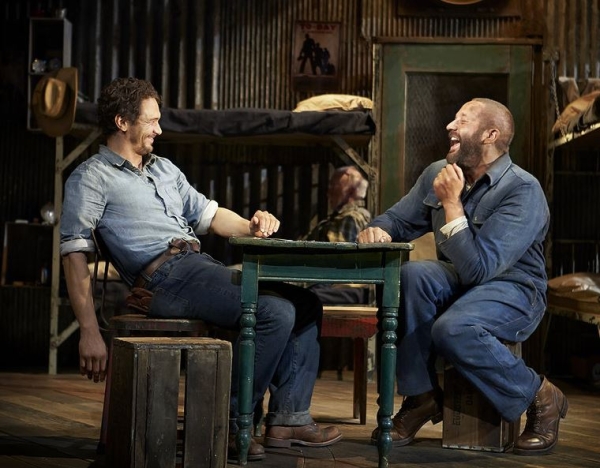
(© Richard Phibbs)
Alternately beloved and reviled by the general public, actor James Franco has decided to take the next step in his polarizing career: Broadway. Franco's detractors might think it's just another feather in the cap of this actor-writer-professor-visual artist, but in Anna D. Shapiro's compelling revival of John Steinbeck's Of Mice and Men at the Longacre Theatre, Franco proves that he's not just playing games. As the stoic worker George Milton, a man who must make one of the hardest decisions in the whole canon of American literature, Franco displays the chameleonic talents his fans are fully aware he has in his arsenal.
That the play Of Mice and Men hasn't been seen on Broadway since 1975 is fairly puzzling, though moderately understandable. Written in 1937, Steinbeck's stage adaptation of his own "playable novel," published the same year, is very much the product of a different era of writing, one for which a lightning-fast pace was secondary to the creation of strong, human-feeling characters. What Steinbeck provides, however, is a razor-sharp exploration of friendship and loyalty, of outsiders and loneliness, and of best-laid plans that go astray.
The Dust Bowl-era drama focuses on the friendship between George and his ironically named companion Lennie Small (the Irish actor Chris O'Dowd). As they travel from farm to farm looking for work, George and the fiercely strong but developmentally disabled Lennie share the dream of being able to own their own ranch and "live off the fatta the lan'." Where they end up changes their relationship and alters the goal they so desperately wish to attain.
O'Dowd is the ideal Lennie as Steinbeck described, a "huge man, shapeless of face…with wide, sloping shoulders," while Franco perfectly fits George: "small and quick, dark of face, with restless eyes and sharp, strong features." Together the actors form one of the most affecting stage friendships in recent memory. This is a friendship that you care about, and their performances are powerful because they are so recognizably human. Watching the endearing O'Dowd, bushy-bearded and bald-headed, lovingly banter in the manner of true friends with Franco's cunning, volatile George makes the play's outcome even more horrifying.
Fortunately, though, Shapiro hasn't guided her stars to play the well-known ending from the start. That is, when Franco and O'Dowd first appear on the dusty stretch of side road of Todd Rosenthal's set, fate and destiny have not yet been determined. George and Lennie haven't landed on the ranch where one of the men will meet his doom. Nor have they met Candy (Jim Norton), the physically disabled bunkhouse cleaner who takes a liking to their dream, or Curly (Alex Morf), the violent son of the ranch's boss, or Curly's fetching, attention-seeking wife (Leighton Meester, of TV's Gossip Girl).
No, you don't anticipate what's going to happen when the first lines are uttered, and that is precisely why Shapiro's revival is so noteworthy. Here is a story that almost everyone knows and yet somehow plays out like a genuine suspense thriller. Shapiro keeps the tension steadily rising until the final moments, when you're literally at the edge of your seats and ready to gasp. And the text, as recited by this assortment of extremely contemporary actors, sounds like it could have been written yesterday.
Morf's Curly is mean and hate-inspiring, and Jim Parrack, Joel Marsh Garland, and James McMenamin make distinct impressions as his ranch underlings. Ron Cephas Jones brings an air of gravitas to the black stable hand Crooks, and the always-tremendous Norton delivers a performance as Candy that not only rips out your heart but proudly waves it in your face. The only weak link of the ensemble, really, is Meester, whose flatness in a role that serves as the catalyst for the play's climax doesn't gel with the evocative portrayals of her costars.
Steinbeck's milieu is expertly captured by Shapiro's design team. Japhy Weideman's lighting nicely renders the harsh, hot sun of the daytime and cool, moonlit skies of night on Rosenthal's looming set. Suttirat Larlarb's period costumes superbly evoke the era and location simply by looking and feeling like they're well-worn. While David Singer's incidental music has a bit too much of a country twang, Rob Milburn and Michael Bodeen's soundscape of howling animals further elevates the production's ominous overtones.
A piece of writing that so intrinsically understands the feeling of being alone is hard to find. Still, despite the novel's canonical status as literature, the stage version of Of Mice and Men has never really found its way into the pantheon of Great American Plays. Shapiro's revival, with Franco and O'Dowd at the fore, makes a very strong case for this heartbreaking drama to receive the legacy it richly deserves.








